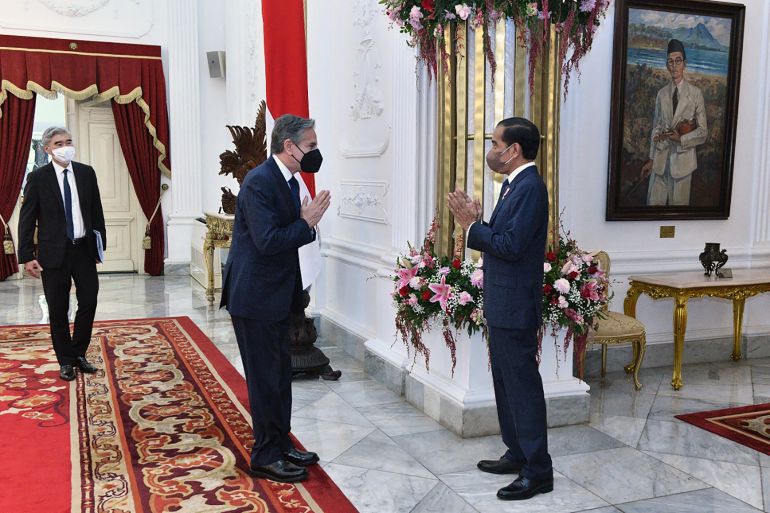Indonesia cites strong US commitment as Blinken starts ASEAN tour
US Secretary of State Antony Blinken to deliver a speech Tuesday in Jakarta on Washington’s approach to Indo-Pacific.

US Secretary of State Antony Blinken made a “very noticeable” commitment to Indonesia, the country’s foreign minister has said, as the top American diplomat began a tour of Southeast Asia amid growing tensions with China in the region.
Blinken met Indonesia President Joko Widodo on Monday and emphasised the importance of the “strategic partnership” between the two countries, the US Department of State said in a statement.
Keep reading
list of 3 itemsChina’s Xinjiang province an ‘open-air prison’, US official says
US sanction forces China’s AI firm SenseTime to delay IPO
Blinken lauded “Indonesia’s leadership” in the Indo-Pacific calling the country “the world’s third-largest democracy and a strong proponent of the rules-based international order”, the statement read.
After Blinken’s meeting with the Indonesian president, known as Jokowi, the country’s Foreign Minister Retno Marsudi said Washington appeared interested in forging partnerships with Jakarta, including on infrastructure.
“The US commitment was very noticeable,” Retno told reporters, without going into further detail.
The US secretary of state is set to deliver a speech in the Indonesian capital on the Biden administration’s approach to the Indo-Pacific on Tuesday morning local time.
Blinken also will make stops in Malaysia and Thailand during his tour of the region, which has seen an intensifying competition for influence between Washington and Beijing.
Daniel Kritenbrink, assistant US secretary of state for East Asian and Pacific affairs, told reporters in advance of Blinken’s trip that the US plans to take engagement with the 10-member Association of Southeast Asian Nations (ASEAN) to “unprecedented levels”.
President Joe Biden participated in a US-ASEAN virtual summit in October, pledging to deepen cooperation with the bloc. The US has previously voiced support for some ASEAN countries in tensions with China over the South China Sea, a major trade route that Beijing claims as its own.
In an opinion piece published on Monday, the Chinese state-owned Global Times said Blinken’s visit to Southeast Asia “failes to change the equilibrium” in the region.
“These countries are good at maintaining a balance between China and the US, in terms of neither being wholly dependent on China or the US, which is a characteristic of foreign policies in many countries in the region,” Gu Xiaosong, dean of the ASEAN Research Institute of Hainan Tropical Ocean University, told the Global Times.
On Sunday, the US, Australia and Japan also announced efforts to fund an undersea cable to boost internet access in the three tiny Pacific countries of Nauru, Kiribati and the Federated States of Micronesia.
Blinken’s visit to Southeast Asia came less than a week after the US, Canada and Australia announced a diplomatic boycott of the 2022 Winter Olympics in Beijing, citing human rights abuses by the Chinese government, including the treatment of Muslim Uighurs in the Xinjiang region.
The US has accused China of committing genocide against the Uighurs – a charge the Chinese government has denied. China rejected the diplomatic boycott as “political manipulation” that went against the spirit of the Olympics.
China objected earlier this year to joint efforts by the US and UK to supply Australia with nuclear-powered submarines. Beijing also voiced concern about Biden’s efforts to strengthen the Quad alliance with India, Japan and Australia after the White House hosted a summit in September.
Amid these many points of tension, Biden last month held a virtual meeting with Chinese President Xi Jinping, calling for managing disagreements while working together on common interests with Beijing.
Ahead of the meeting Xi warned of returning to Cold War-era tensions in the Asia-Pacific.
“The Asia-Pacific region cannot and should not relapse into the confrontation and division of the Cold War era,” he said.